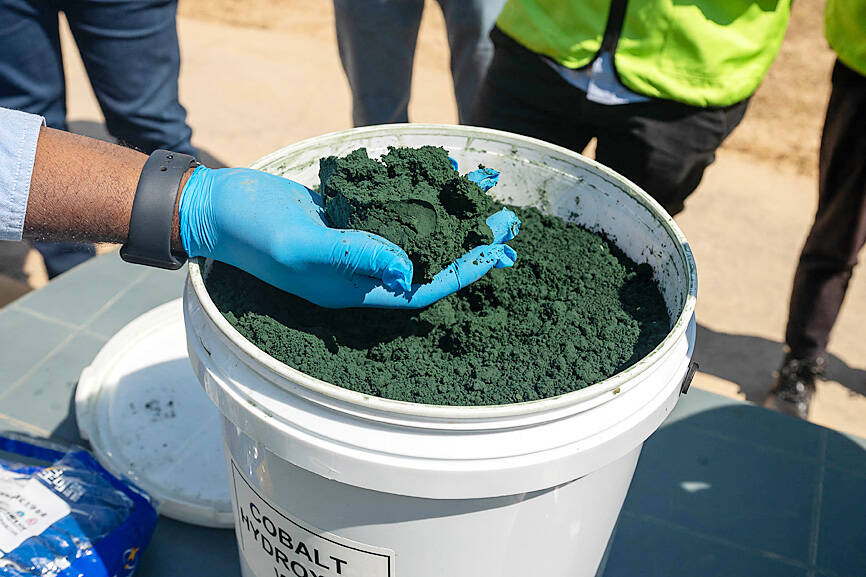China is taking advantage of tumbling cobalt prices to build up its inventories of the metal used in electric-vehicle batteries and aerospace alloys.
The Chinese National Food and Strategic Reserves Administration, the government stockpiling body, has agreed to purchase about 5,000 tonnes of cobalt from three local refiners and a state-owned trader this week, people familiar with the matter said.
The volume is higher than the original plan to buy 2,000 tonnes, after additional offers from the suppliers prompted the state stockpiler to take more grades of the metal, said the people, who asked not to be identified because they’re not authorized to speak publicly.

Photo: AFP
The National Food and Strategic Reserves Administration did not reply to a faxed request for comment.
Global cobalt prices have tumbled more than 60 percent from May last year on rising output from the Democratic Republic of the Congo (DRC) and Indonesia.
There could be a global surplus of 30,000 tonnes of the metal this year, which might widen further next year, Rystad Energy said.
Chinese refiners, which dominate processing of cobalt, are heavily reliant on material that comes from DRC mines, although Indonesia is quickly emerging as an important source.
Surging violence in the eastern DRC could further destabilize the country as it prepares for elections in December, a group of experts from the UN warned last month.
On the demand side, the adoption of cheaper cobalt-free lithium iron phosphate batteries, has gathered momentum. Ethical concerns about cobalt production from DRC have also fueled the shift away from cobalt in cathode chemistry.
However, cobalt is still crucial in diverse applications from aerospace materials to magnets.
The last time China stocked up on cobalt was in 2020 when it bought 2,000 tonnes of the metal for its strategic commodity reserves, to counter supply disruptions in DRC due to COVID-19.

Intel Corp chief executive officer Lip-Bu Tan (陳立武) is expected to meet with Taiwanese suppliers next month in conjunction with the opening of the Computex Taipei trade show, supply chain sources said on Monday. The visit, the first for Tan to Taiwan since assuming his new post last month, would be aimed at enhancing Intel’s ties with suppliers in Taiwan as he attempts to help turn around the struggling US chipmaker, the sources said. Tan is to hold a banquet to celebrate Intel’s 40-year presence in Taiwan before Computex opens on May 20 and invite dozens of Taiwanese suppliers to exchange views

Application-specific integrated circuit designer Faraday Technology Corp (智原) yesterday said that although revenue this quarter would decline 30 percent from last quarter, it retained its full-year forecast of revenue growth of 100 percent. The company attributed the quarterly drop to a slowdown in customers’ production of chips using Faraday’s advanced packaging technology. The company is still confident about its revenue growth this year, given its strong “design-win” — or the projects it won to help customers design their chips, Faraday president Steve Wang (王國雍) told an online earnings conference. “The design-win this year is better than we expected. We believe we will win

Chizuko Kimura has become the first female sushi chef in the world to win a Michelin star, fulfilling a promise she made to her dying husband to continue his legacy. The 54-year-old Japanese chef regained the Michelin star her late husband, Shunei Kimura, won three years ago for their Sushi Shunei restaurant in Paris. For Shunei Kimura, the star was a dream come true. However, the joy was short-lived. He died from cancer just three months later in June 2022. He was 65. The following year, the restaurant in the heart of Montmartre lost its star rating. Chizuko Kimura insisted that the new star is still down

While China’s leaders use their economic and political might to fight US President Donald Trump’s trade war “to the end,” its army of social media soldiers are embarking on a more humorous campaign online. Trump’s tariff blitz has seen Washington and Beijing impose eye-watering duties on imports from the other, fanning a standoff between the economic superpowers that has sparked global recession fears and sent markets into a tailspin. Trump says his policy is a response to years of being “ripped off” by other countries and aims to bring manufacturing to the US, forcing companies to employ US workers. However, China’s online warriors